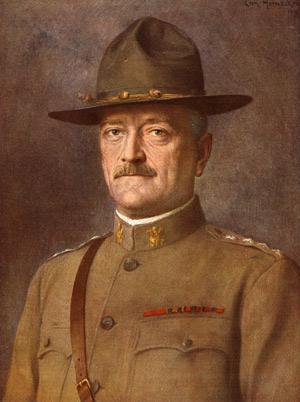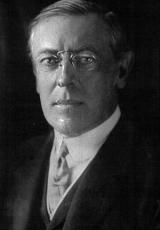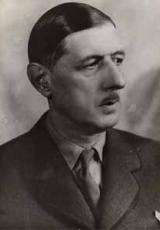John Pershing

Source : l'album de la guerre 1914-1919. © L'illustration
John Joseph Pershing was born on the 13th of September 1860 in Linn Country, a village in Missouri. His family was originally from the Alsace - one of his ancestors had emigrated to America in the middle of the 18th century. At the age of 22, after having been a teacher, he went to the West Point Military Academy. He left in 1886 and then followed a classic military career: as sub-lieutenant in Arizona, an instructor in military science and tactics at the University of Nebraska (1891) where he also studied law and in the 10th Cavalry Regiment in Montana. As a lieutenant in Washington (1897), he took part in the Cuban war and then in the suppression of the Moros uprising in the Philippines. In 1901, Captain Pershing was military attaché in Tokyo and closely followed the Russo-Japanese war. In 1906, he was appointed Brigadier General and carried out a new mission in the Philippines before taking a post in Europe, where he studied French and in 1914 he took charge of the Western Division in San Francisco. He took part in suppressing the revolt by Pancho Villa in Mexico. In August 1915, his wife and three of his children died in a fire in San Francisco. On the 10th of May 1917, President Wilson appointed him as commander of the American Expeditionary Corps in Europe. On the 13th of June 1917, General Pershing arrived in Paris.
Thirteen days later, the first American troops landed at Saint-Nazaire. Until the 11th of November 1918, General Pershing continually strove to create a vast autonomous American army along the French front. General Pershing left France on the 1st of September 1919; on the 29th of September, American Congress stated that his country could be proud of him. Just after the war, Pershing was appointed Commander in Chief of the American Army (1921). In 1924 he became a reserve officer. He thus retired from public life, only becoming involved in an official capacity for commemorative ceremonies, in which he participated every year as the founding chairman of the "American Battle Monuments Commission", the organisation that manages American graves and memorials in Europe. In 1937 he also took part in the inauguration of his own statue at Versailles. He came back to France for the last time in May 1939. He published "My Experiences in the World War" in 1931, a work that was to be awarded a Pulitzer Prize the following year (published in France by librairie Pion). On the 4th of August 1940, he addressed the American people for the last time via a radio message in which he took a stance against Hitlerism. In 1944, he was admitted to the Walter Reed hospital in Washington; that is where he was to receive General de Gaulle in July of the same year. John J. Pershing died on the 15th of July 1948 and was buried at the Arlington national cemetery in the presence of President Harry S. Truman.



